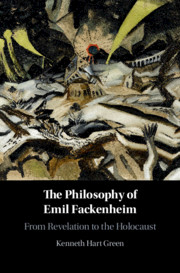Book contents
- The Philosophy of Emil Fackenheim
- The Philosophy of Emil Fackenheim
- Copyright page
- Dedication
- Epigraph
- Contents
- Acknowledgments
- Abbreviations
- Introduction The Unending Struggle with Revelation in the Thought of Emil Fackenheim
- 1 What Is Faith?
- 2 Individual versus Collective, Rational versus Mystical
- 3 Revelation as a Possibility
- 4 On Authority, Tradition, and History
- 5 Divine Power versus Human Freedom
- 6 From Presence to History
- 7 Confronting Radical Evil as Rupture
- 8 Diabolical Revelation and the Holocaust
- 9 Negative Absolute and Fragmentary Transcendence
- Conclusion Revelation of the Diabolical Truth in History
- Bibliography
- Index
6 - From Presence to History
Published online by Cambridge University Press: 06 October 2020
- The Philosophy of Emil Fackenheim
- The Philosophy of Emil Fackenheim
- Copyright page
- Dedication
- Epigraph
- Contents
- Acknowledgments
- Abbreviations
- Introduction The Unending Struggle with Revelation in the Thought of Emil Fackenheim
- 1 What Is Faith?
- 2 Individual versus Collective, Rational versus Mystical
- 3 Revelation as a Possibility
- 4 On Authority, Tradition, and History
- 5 Divine Power versus Human Freedom
- 6 From Presence to History
- 7 Confronting Radical Evil as Rupture
- 8 Diabolical Revelation and the Holocaust
- 9 Negative Absolute and Fragmentary Transcendence
- Conclusion Revelation of the Diabolical Truth in History
- Bibliography
- Index
Summary
Fackenheim eventually became dissatisfied with the modern existential conception of revelation elaborated by Rosenzweig and Buber. This should not be confused with his ever-mounting concern with the Holocaust, although both emerged in tandem. Fackenheim articulated Rosenzweig’s and Buber’s basic conception better than they did, as the ever-present possibility of revelation, with a content reduced to nothing but pure Presence. This rested on the prior philosophic argument that the possibility of revelation cannot be refuted, an argument that remains valid despite modern rationalistic criticism. Fackenheim learned this from Leo Strauss, who thought through the Buber–Rosenzweig position better than they had themselves. This initiated a fruitful period of original theological reflection for Fackenheim, between 1945 and 1967, but he found this concept was insufficiently coherent to be implemented as a workable guide to actual religious faith and life.
- Type
- Chapter
- Information
- The Philosophy of Emil FackenheimFrom Revelation to the Holocaust, pp. 200 - 226Publisher: Cambridge University PressPrint publication year: 2020



